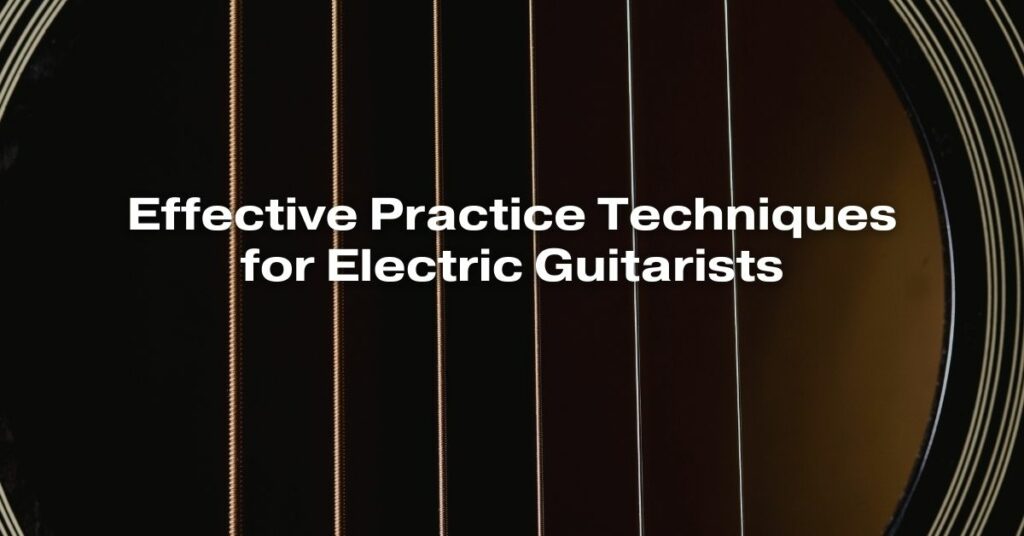Learning to play the electric guitar can be a thrilling and rewarding journey, but like any skill, it requires time, effort, and dedication. Effective practice is the key to becoming a proficient guitarist, and in this article, we will explore a range of techniques and strategies that will help you make the most of your practice sessions. Whether you’re a beginner or an experienced player looking to refine your skills, these tips will guide you on your path to becoming a more accomplished electric guitarist.
Set Clear Goals
Before you pick up your guitar, it’s crucial to establish clear and achievable goals for your practice session. These goals could range from mastering a specific technique, learning a new song, or improving your speed and accuracy. Having well-defined objectives will give your practice purpose and help you stay motivated.
Structured Practice Routine
Consistency is the key to improvement. Create a structured practice routine that fits your schedule. Dedicate time to warm-ups, technique drills, learning new material, and jamming. A well-organized practice routine ensures that you cover all aspects of your playing.
Warm-Up Exercises
Warming up is essential to prevent injuries and prepare your fingers for intense playing. Simple finger and hand stretches, along with scale exercises, can get your fingers limber and ready to tackle more challenging material.
Focus on Technique
Building solid technique is fundamental for any electric guitarist. Spend a significant portion of your practice time on exercises that improve your finger strength, dexterity, and control. This can include exercises like scales, arpeggios, and chromatic runs. Slow and deliberate practice is crucial here to ensure precision and avoid developing bad habits.
Learn Scales and Music Theory
Understanding scales and music theory is vital for improvisation and songwriting. Invest time in learning scales, such as the pentatonic and diatonic scales, and how they relate to different musical keys. This knowledge will open up new creative avenues for your playing.
Study Music Transcription
Transcribing music, whether it’s your favorite songs or guitar solos, is an excellent way to develop your ear and musical vocabulary. Start with simple riffs and gradually work your way up to more complex pieces. Transcription helps you internalize the nuances of different styles and techniques.
Slow Practice
When tackling challenging material, slow practice is your best friend. Gradually increase the tempo as you become more comfortable with the passage. This method allows you to build muscle memory and ensure precision in your playing.
Metronome Practice
A metronome is a valuable tool for building your sense of timing and rhythm. Use it during your practice sessions to keep your playing consistent and help you develop your sense of groove. Start at a slow tempo and gradually increase it as you become more comfortable.
Record Yourself
Recording your practice sessions is an excellent way to objectively assess your progress. Listen to your recordings and identify areas that need improvement. It’s a great way to track your journey and witness your growth as a guitarist.
Play Along with Backing Tracks
Playing along with backing tracks is a fun and effective way to practice your timing, improvisation, and stage presence. You can find a wide variety of backing tracks online in different styles and keys.
Experiment with Effects and Pedals
Electric guitarists have access to a wide range of effects and pedals. Experimenting with different sounds can inspire your creativity and help you discover unique tones. Incorporate these elements into your practice to expand your sonic palette.
Join a Band or Play with Others
Playing with other musicians is a valuable experience for electric guitarists. Join a band, attend jam sessions, or collaborate with other instrumentalists. This interaction enhances your ability to listen, respond, and adapt in a musical context.
Conclusion
Becoming an accomplished electric guitarist requires dedication and consistent practice. By setting clear goals, structuring your practice routine, working on technique, and exploring various aspects of guitar playing, you can accelerate your progress. Remember that the journey is as important as the destination, so enjoy the process of honing your skills. With patience and a commitment to effective practice techniques, you’ll find yourself becoming a more proficient and confident electric guitarist. So, plug in, pick up your guitar, and let the music flow!


